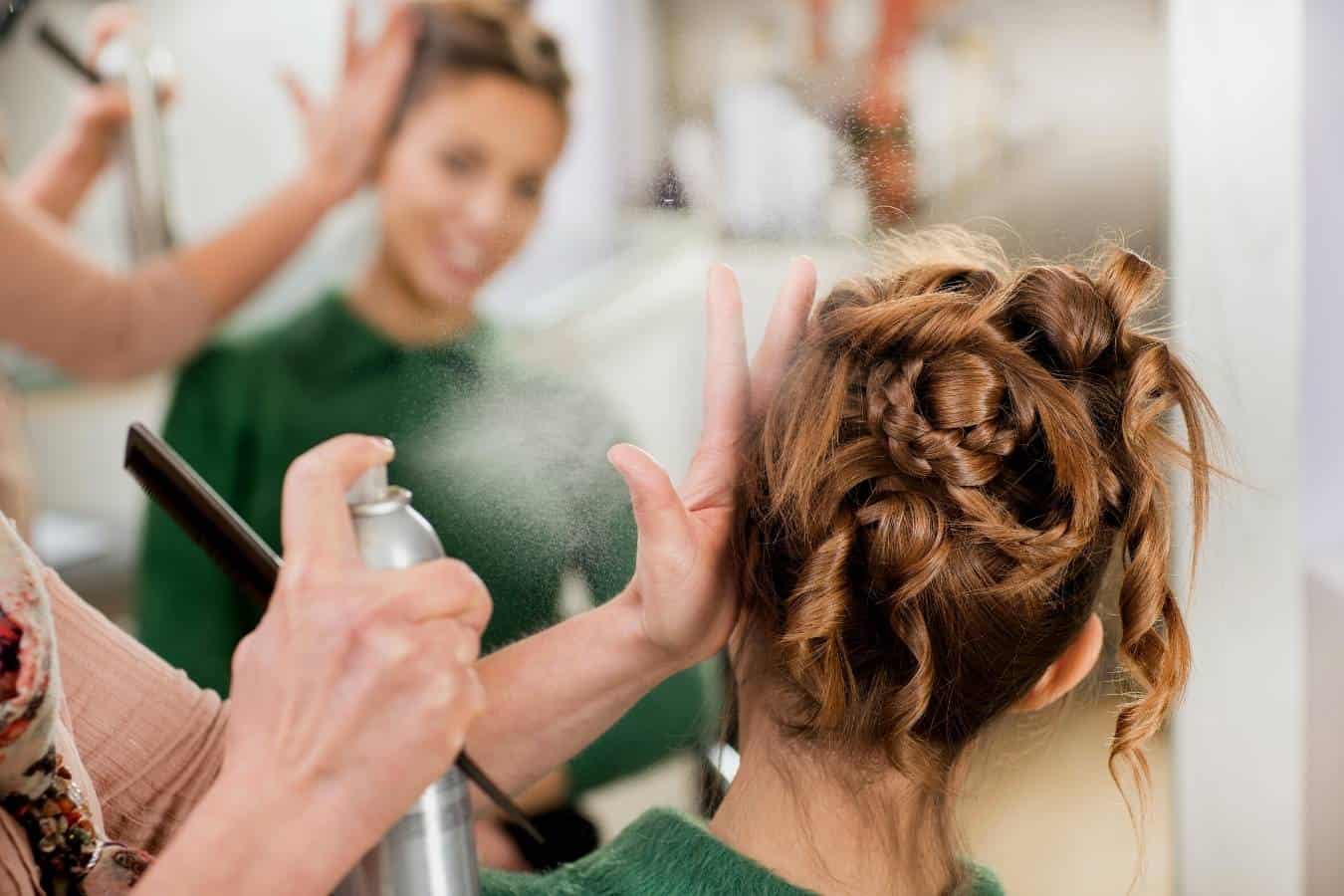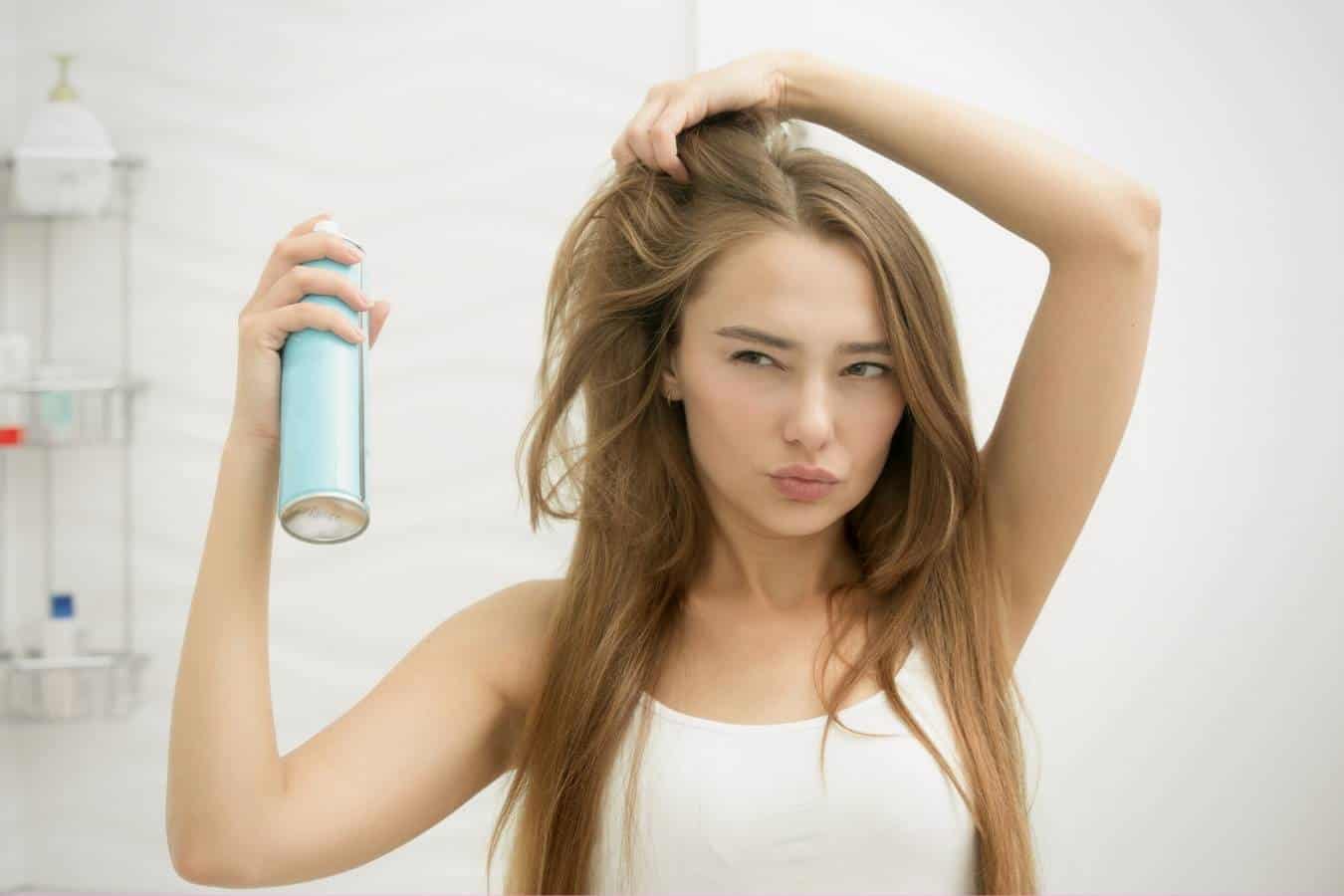Using hairspray is inevitable if you’re looking to keep frizz and flyaways at a minimum. But is hairspray good or bad for your hair?

The difference between a good hairspray and a harmful one for your hair is based on its composition.
The differential component, in this case, is alcohol, which could potentially cause subsequent hair loss, especially with continuous use. In this article, we will cover the details of how hairspray could be good or bad for your hair.
Is Hairspray Good or Bad for Hair?
If you use hairspray products with heavy alcohol content instead of ones with natural resins, you might experience hair damage and hair loss. You should always wash or brush out the hairspray within 24 hours of using it to prevent damage.
However, in many cases, hair loss may have less to do with hair sprays than we think. It could occur due to genetics or stress factors.
Many people use hair spray products every day. However, long-term use could end up deteriorating the health of their scalp and hair.
Consequently, the roots are weakened, and subsequently the excessive fall out of the hair, even generating true baldness in different spots on the head.
The key is to use hairspray in moderation and follow these rules:
- Do not abuse hairspray.
- Apply it 30 cm from your hair
- Never directly spray on your scalp but on the ends
- Do not keep the hairspray on your hair for more than one day and wash your hair to remove all the products that you have worn during the last 24 hours.
- Purchase lacquers for professional use, and not the ones that cost less in the supermarket. The professional ones are lacquers that do not get the hair dirty or mistreat the hair since they use natural resins.
Also Read: Is Baby Shampoo Good For Hair Loss? (The Facts)
Can Hairspray Damage Your Hair?

If there is something that, at a certain age, everyone tries to avoid at all costs, it is hair loss and hair damage.
There are certain treatments that help to slow it down or stop hair damage from occurring so persistently, but if we do not continue using hairspray products, it is inevitable that we cannot stop the loss of hair.
Not all products are toxic and occasional use is harmful, but abusive use will cause hair to change its appearance, fall excessively and appear more fragile and brittle.
This is due to the excess of chemical elements in lacquers, gels, and foams, among others.
It’s therefore good to switch up your products from time to time and use alternatives to hairspray if needed.
What Does Hairspray Contain?
Most hairsprays contain panthenol, vitamin E, sodium PCA, and silicone.
These ingredients allow moisture retention and sheen to the hair follicles. Hairspray can contain different types of alcohol.
If alcohol is used in these types of products, it is to protect them from microbes and thicken them (as can happen with foams).
They act as preservatives to keep the product fresh so it can last longer. In addition, if it has a nice smell, it could be due to this ingredient.
However, the alcohol applied to the hair can make it dry out and have less shine because it takes part of the moisture out of the hair follicles.
Other Ingredients
Other ingredients include:
- Propellants
- Plasticizers
- Luster agents for shine
- Concentrates
- Fragrances
Ingredients To Avoid In Hair Products
Regarding the use of hair sprays, it could be less harmful depending on its ingredients.
Lacquer contains a greater amount of alcohol and other elements since its format is in a spray.
What is the problem with the hairspray?
Above all, once it dries and sets on the hair, does not let it breathe, nor does it allow the scalp to breathe if applied from the beginning to the root.
Continued use of hair leaves hair weak and makes it fall out.
Limiting its use to a small amount or using it on a few occasions will help to see how the hair returns to its initial shape and volume.
The most common ingredients to avoid as it relates to hair products are:
- Silicones
- Sodium lauryl sulfate (SLS) – Sulfates
- Ammonium lauryl sulfate (ASL)
- Sodium chloride
Silicones
Dimethicone: softens your hair, but can weaken it.
Advantage
- It is the most used silicone in cosmetics
- It is a polymer obtained from silicon through chemical processes
- Creates a protective barrier that moisturizes your hair by preventing the water present from evaporating
- Take care of your hair from aggressive agents during winter, a time when it weakens the most loses volume, texture and tends to frizz
Cons
- It blocks your pores, making it difficult for you to sweat away your impurities
- For some people, this ingredient can cause an allergic reaction such as itching or burning of the scalp
Sulfates
Sodium Lauryl Sulfate: a foam that is attractive to the eye and pleasant to the touch.
Advantage:
- It is a detergent to clean your hair
- Makes hair products thicker
- Eliminates accumulated fat on the scalp
Cons
- It irritates the scalp and dries it out
- It can cause dandruff
- It can cause eczema or redness
Parabens
The methylparaben and propylparaben make hair products more durable. However, it has its disadvantages as shown by a 2004 research study done by Dr. Philippa Darbre from the University of Reading in Edingburk, UK.
Advantage
- They are known preservatives
- They prevent fungi, bacteria, or yeast from deteriorating your hair hygiene products
Cons
- It can cause allergies and irritations to the scalp
- They cause hair loss
- Some research indicates that it alters the balance of hormones
Disclaimer: This site is not intended to provide professional or medical advice. All of the content on LovedByCurls.com is for informational purposes only. All advice should be followed at your own discretion. Ingredients may change at any time so always check the product label before using. Check our full disclaimer policy here.
